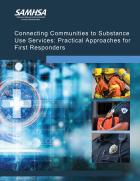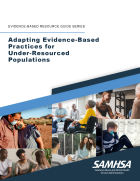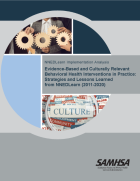This report provides background history of the development of Peer Recovery (PR), including an overview of the current landscape of PR Programs. This report also provides a description of the variation in peer recovery rates, supervision, credentialing, and substance use disorder vs mental health.
Dashboard: Filter Bricks
Main page content


This report explores the use of Value-Based Payment (VBP) model and the potential to improve delivery of integrated and coordinated substance use disorder (SUD) treatment services.

This guide provides practical, evidence-based information that first responder agencies, their partners, and communities can use to implement or expand practices and programs for linking people to substance use services.

The N‑SUMHSS is a voluntary annual survey of all active substance use and mental health facilities in the United States, its territories, and D.C. The annual report presents findings on the general profile of substance use and mental health facilities, use of pharmacotherapies/medications, language assistance provided, and suicide prevention services.

This guide focuses on research supporting adaptations of evidence-based practices (EBPs) for under-resourced populations. Adaptations involve tailoring care, programs, and services to the cultural, social, gender, and demographic contexts of the people served to yield positive outcomes.

This report provides findings from a qualitative analysis of evidence-based and culturally relevant behavioral health practices offered at NNEDLearn, a SAMHSA training, offered from 2011 to 2020. It includes an overview of NNEDLearn, case studies, strategies and lessons learned, and conclusion.

This guide helps health care providers, systems, and communities support recovery from substance use disorders via employment mechanisms. It describes relevant research, examines emerging and best practices, identifies knowledge gaps and implementation challenges, and offers resources.

This Advisory is based on TIP 55, Behavioral Health Services for People Who Are Homeless. It addresses the fundamentals of how providers and administrators can employ approaches to address the complex challenges of providing integrated treatment services to clients experiencing homelessness.

This Advisory can help clinicians who work in a mental health facility implement a tobacco cessation program to reduce the use of tobacco-related products and tobacco-related diseases among clients with SMI.

TIP 61 provides behavioral health professionals with practical guidance about Native American history, historical trauma, and critical cultural perspectives in their work with American Indian and Alaska Native clients. The TIP discusses the demographics, social challenges, and behavioral health concerns of Native Americans. It highlights the importance of providers’ cultural awareness, cultural competence, and culture-specific knowledge. The TIP also helps administrators, program managers, and clinical supervisors foster a culturally responsive environment for American Indian and Alaska Native clients. Specific topic areas include workforce development strategies, program and professional development considerations, and culturally responsive policies and procedures.
Displaying 1 - 10 out of 33

